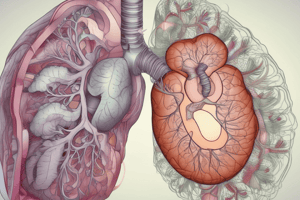Podcast
Questions and Answers
Which type of breathing accounts for 70% of pulmonary ventilation at rest?
Which type of breathing accounts for 70% of pulmonary ventilation at rest?
- Diaphragmatic breathing
- Thoracic breathing
- Abdominal breathing (correct)
- Respiratory breathing
In which conditions does breathing become mainly thoracic due to limited diaphragmatic movement?
In which conditions does breathing become mainly thoracic due to limited diaphragmatic movement?
- Chronic obstructive pulmonary disease
- Pregnancy and ascites (correct)
- Asthma
- Pneumonia
What is a characteristic of bronchial breath sounds?
What is a characteristic of bronchial breath sounds?
- Louder and lower in pitch
- Heard often in the 1st and 2nd interspaces anteriorly
- Shorter expiratory phase than inspiratory phase (correct)
- Normal if heard over the lung field
Where is broncho-vesicular sound often heard?
Where is broncho-vesicular sound often heard?
Which type of breath sound is soft and low pitched?
Which type of breath sound is soft and low pitched?
Flashcards are hidden until you start studying
Study Notes
Inspiratory Sound
- Inspiratory sound is longer than expiratory sound
- Inspiration continues without pause through expiration, fading away about one-third of the way through expiration
- Heard over most of the lung fields
Adventitious or Added Breath Sounds
-
Crackles (Rales or crepitation): • Associated with pulmonary edema, early CHF, and pneumonia • Discontinuous, intermittent, non-musical, brief sounds • Heard more commonly with inspiration • Classified as fine or coarse • Caused by air moving through secretions and collapsed alveoli
-
Wheeze: • Associated with asthma and COPD • Produced when air flows through narrowed airways • Continuous, high-pitched, musical sound, longer than crackles • Heard more with expiration, can be heard on inspiration
-
Rhonchi: • Similar to wheezes, but clear upon coughing • Low-pitched, snoring quality, continuous, musical sounds • Implies obstruction of larger airways by secretions • Associated with acute bronchitis
-
Stridor: • Intense inspiratory musical wheeze • Heard loudest over extra-thoracic airways • Can be heard without a stethoscope • Suggests obstructed upper airway • Medical emergency requiring immediate attention
Airway Resistance and Turbulent Flow
- Turbulence increases airway resistance
- Occurs in larger airways where velocity is high and at branch points
- Disorganizes air flow and increases the driving pressure and its resistance
- Bronchoconstriction reduces airway diameter and increases velocity of flow, creating turbulence and generating wheezing in bronchial asthma
Pulmonary Function Tests
- A group of tests that measure how well the lungs take in and release air and move gases such as O2 from the atmosphere into the body's circulation
- Spirometer is an instrument used to evaluate respiratory function
- Can distinguish between: • Obstructive pulmonary disease – ↑ airway resistance • Restrictive pulmonary disease – ↓ in total lung capacity from structural/functional lung changes
Studying That Suits You
Use AI to generate personalized quizzes and flashcards to suit your learning preferences.




